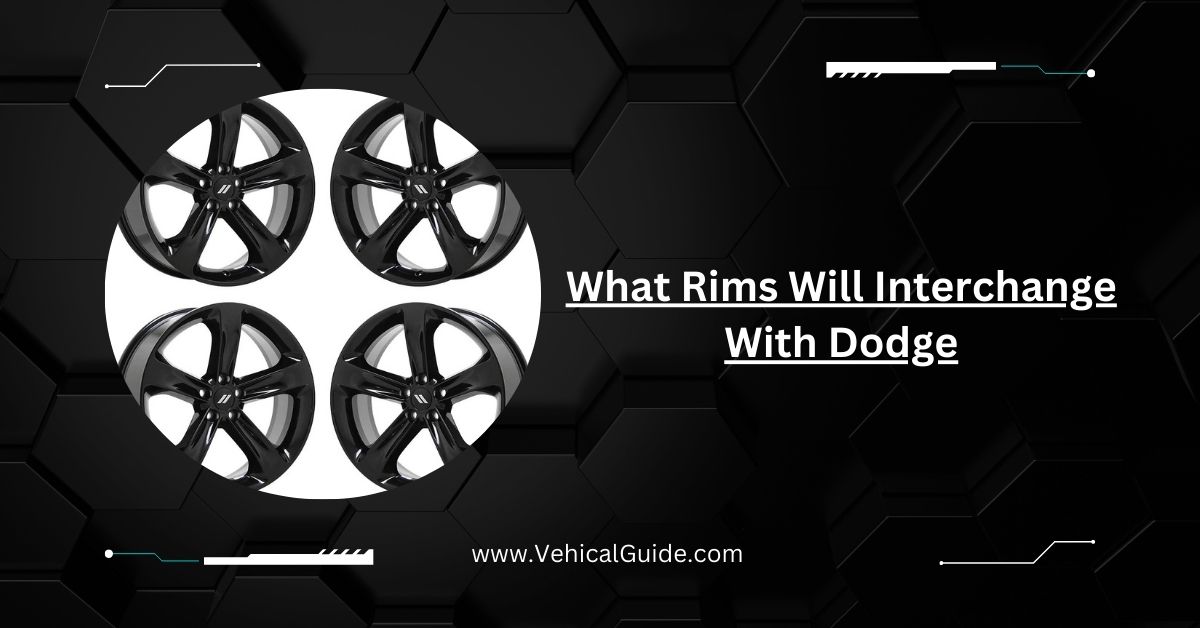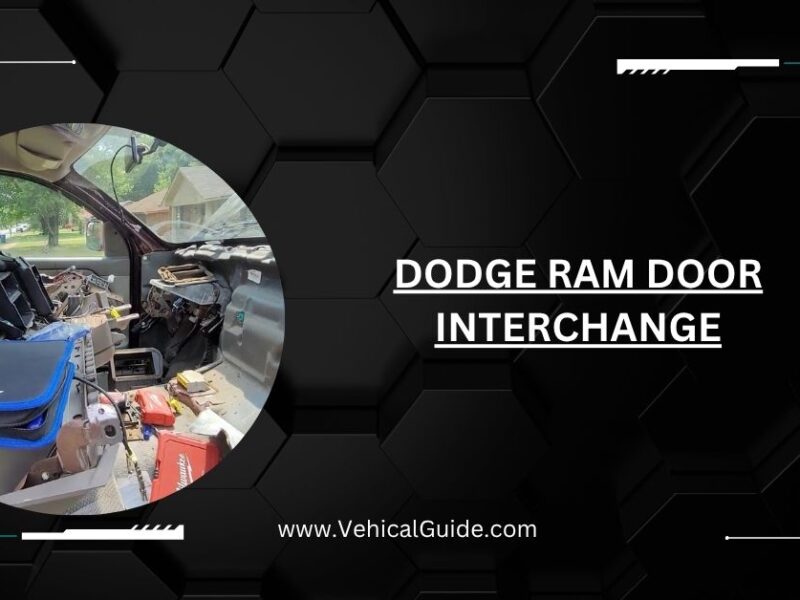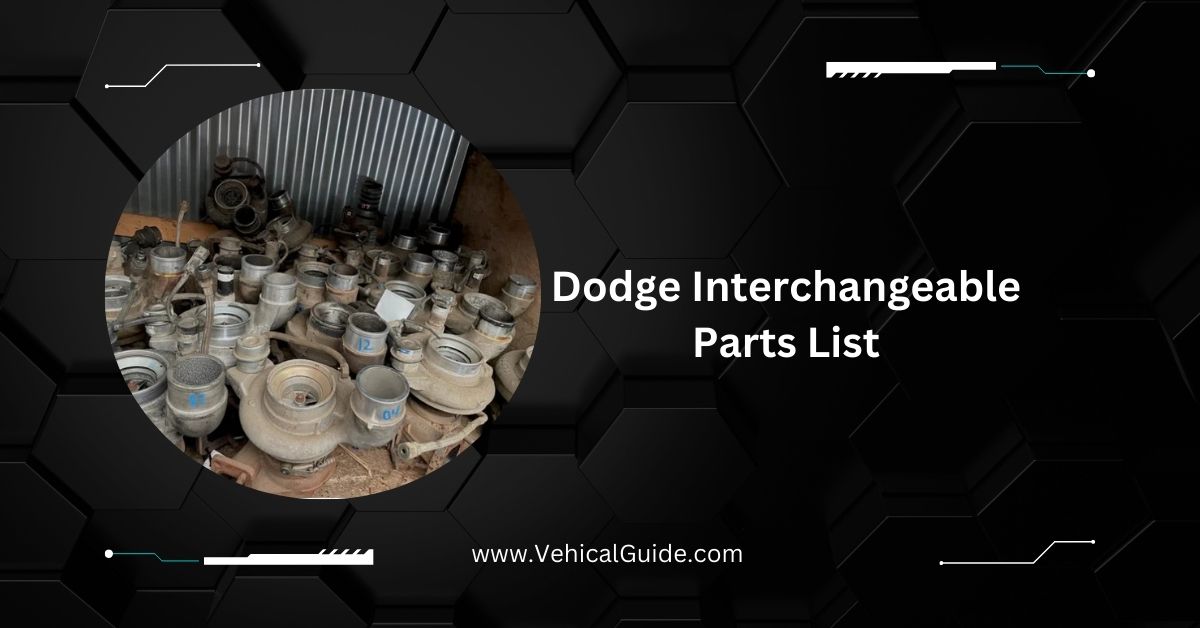Table of Contents
I recently learned a lot when I was considering changing the rims on my Dodge. I found out how important it is to check the bolt pattern and offset to make sure the new rims would fit properly.
This article discusses important things to know about rims for Dodge vehicles. It covers topics like bolt patterns, offsets, and the difference between summer and winter rims. It also warns against mixing different tire brands and highlights the need for regular maintenance.
In this article, you’ll discover important tips to choose the perfect rims for your Dodge and keep your ride safe and stylish.
What is the bolt pattern for Dodge vehicles – Get the Right Fit!
The bolt pattern is a crucial specification that describes how the bolts of a wheel are arranged. Most modern Dodge vehicles have a bolt pattern of 5×114.3 mm, which means there are five bolt holes arranged in a circle with a diameter of 114.3 mm (4.5 inches).
However, different Dodge models, especially trucks like the Dodge Ram, may have different patterns, such as 5×139.7 mm. To find out your specific vehicle’s bolt pattern, you can refer to the owner’s manual or measure it directly by counting the bolt holes and measuring the distance across them.
How do I know if my rims are compatible with my Dodge?
To determine if rims are compatible with your Dodge, it’s important to check several details such as bolt pattern, offset, diameter, and width. The bolt pattern refers to how many bolt holes there are and their arrangement.
Next is the offset, which is how far the mounting surface is from the centerline of the wheel. The offset affects how the wheel sits inside the wheel well. If the rims have a significantly different offset, they may not fit correctly, which can lead to handling issues.
Can I put larger rims on my Dodge vehicle – Ensure Proper Fitment!
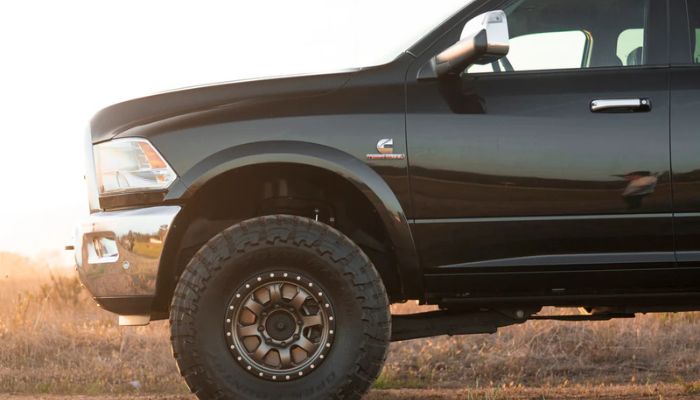
Yes, you can put larger rims on your Dodge vehicle, but there are several factors to consider before doing so. First, larger rims can enhance the vehicle’s visual appeal and performance by improving handling, but they can also change the ride quality.
Additionally, upgrading to larger rims can affect the vehicle’s speedometer accuracy. If you choose a size that significantly alters the overall diameter of the tire and wheel combination, the speedometer may read higher or lower than your actual speed.
What types of rims are available for Dodge vehicles?
- Steel Rims: Durable and affordable, making them ideal for everyday driving.Heavier than other types but can withstand rough conditions.Easier to repair if damaged.
- Aluminum Rims: Lighter, which can enhance fuel efficiency.Available in a variety of attractive designs.Typically more expensive, but they improve the vehicle’s appearance.
- Alloy Rims: Made from a mix of metals, offering strength and lightweight performance.Resist corrosion better than steel rims.Come in unique designs and colors for customization.
- Chrome Rims: Feature a shiny finish that many find appealing.Require regular maintenance to maintain their luster.Not ideal for winter conditions due to potential corrosion.
- Custom Rims: Tailored for a distinct appearance, allowing for various designs, sizes, and colors.Important to ensure the right fit for the vehicle.
- Winter Rims: Designed specifically to accommodate winter tires.Typically made of steel for better performance in icy conditions. Help protect more expensive main rims during harsh weather.
What is the offset, and why is it important – Maintain Your Ride
The offset of a wheel is the distance between the wheel’s mounting surface and its centerline. It is measured in millimeters and can be greater than zero, less than zero, or equal to zero. A positive offset means the mounting surface is located toward the front of the wheel, nearer the vehicle.
Offset is important because it directly influences how the wheel sits on the vehicle. If the offset is too positive or too negative, it can lead to various problems, including altered handling, increased tire wear, and potential clearance issues with suspension components.
How can I measure the bolt pattern of my rims – Know Your Specs!
Measuring the bolt pattern of your rims is a straightforward process, and you can do it using a measuring tape or ruler. First, count how many bolt holes your rim has, which will typically be four or five for most vehicles, including many Dodge models.
For a five-bolt pattern, measure from the center of one bolt hole to the center of the bolt hole directly across from it (called the “across measurement”). The distance between these centers gives you the diameter of the circle that forms from the bolt holes.
Do all Dodge models have the same rim size – Consult a Tire Expert!

No, not all Dodge models have the same rim size, as different vehicles are designed for different purposes and functionalities. For example, a Dodge Charger, which is a sports sedan, may have a different rim size than a Dodge Ram truck, which is built for hauling and towing.
Car manufacturers design their vehicles with specific rim sizes to balance performance, ride quality, and safety. For instance, performance cars typically have larger, wider rims for better grip and handling, while trucks may have more robust rims designed to endure heavier loads.
Can I use rims from another make on my Dodge?
Using rims from another make on your Dodge is possible, but several factors must be considered to ensure a safe and successful fit. The most critical factors include bolt pattern, offset, and center bore size.
Next, you need to consider the offset, which is vital for proper wheel fitment. If the offset is significantly different from what is recommended for your Dodge, it may lead to handling issues or clearance problems with brakes or suspension.
What Happens If I Put the Wrong Size Rim on My Dodge?
Interference with Tire Fit:
Using the wrong size rim can prevent the tire from fitting correctly. A rim that is too small may not hold the tire securely, leading to air leaks or blowouts, while a rim that is too large can cause excessive stretching of the tire.
Impact on Vehicle Alignment:
Incorrect rim sizes can lead to wheel misalignment. When your wheels are not aligned properly, it can cause uneven tire wear and affect your steering. You might notice a pulling sensation or difficulty in maintaining a straight path.
Effects on Handling and Traction:
Rims not designed for your Dodge can negatively impact handling. This can result in reduced traction, making it harder to drive safely in adverse weather conditions. Poor handling increases the risk of accidents, especially during sudden maneuvers.
Potential Warranty Issues:
Installing mismatched rims can void your vehicle’s warranty. This could lead to expensive repairs if other issues arise, emphasizing the importance of using the correct size.
Importance of Correct Size:
Ensuring you have the right rim size is crucial for a safe and enjoyable driving experience. Always check your vehicle’s specifications or consult a professional before making changes.
Is it necessary to have a professional install my rims?
While some experienced car enthusiasts might choose to install rims themselves, having a professional do the installation is highly recommended for several important reasons. First and foremost, professional installers have the experience, knowledge, and tools.
A professional can also check for other critical aspects of your vehicle, such as wheel alignment and suspension components. After putting on new rims, alignment is vital to ensure that your vehicle drives straight and doesn’t wear down tires unevenly.
What are hub-centric rings, and do I need them?
Hub-centric rings are small, circular rings made of plastic or aluminum that fit between a wheel’s hub and the center bore of the wheel. Their primary purpose is to ensure a snug and secure fit when the diameter of the wheel’s center bore is larger than the hub of your vehicle.
While not all rims require hub-centric rings, using them can be highly beneficial, especially for aftermarket wheels that might not be designed to fit perfectly onto your Dodge’s hub. If the wheel isn’t correctly centered, it can lead to vibrations while driving.
Can I use tires from another make or model with my Dodge rims?
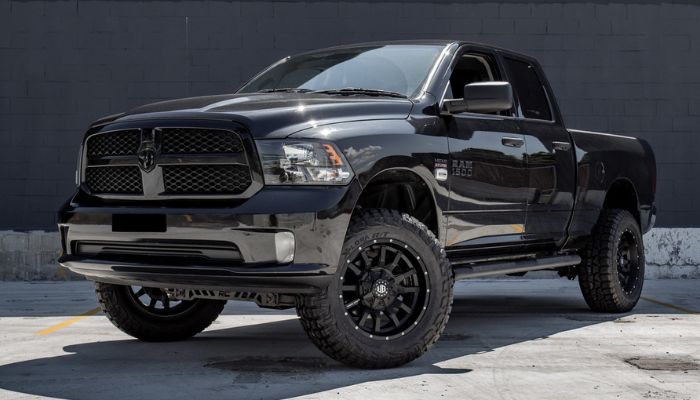
Yes, you can use tires from another make or model with your Dodge rims, but it’s essential to ensure they meet specific criteria. The most crucial factor to consider is the tire size, which is usually denoted in a format like 225/65 R17, where the numbers indicate the width.
Additionally, it’s vital that the load rating and speed rating of the tires match or exceed those recommended for your vehicle. Using tires with a lower rating than necessary can impact safety, handling, and overall vehicle performance.
FAQs:
What is the difference between summer and winter rims?
The differences between summer and winter rims are significant, reflecting their intended use and design features. Summer rims are primarily designed for warm weather and often made from lightweight alloy materials.
What should I do if my rims start to rust?
If you notice that your rims are starting to rust, it’s essential to address the issue promptly to prevent further deterioration. Rust can not only diminish the aesthetic appeal of your vehicle but can also weaken the metal structure of the rims.
Are aftermarket rims safe for my Dodge?
Aftermarket rims can be safe for your Dodge as long as they meet specific standards and specifications. Unlike factory rims, which are engineered specifically for a particular make and model, aftermarket rims come in a vast variety of designs, sizes, and materials.
Can I use spacers with my Dodge rims?
Wheel spacers are devices that allow you to increase the distance between your vehicle’s hub and the wheels, thereby altering the offset of the rims. Using spacers can be advantageous in certain situations, such as accommodating larger brake calipers or providing a wider stance for improved stability and appearance.
In The End:
In conclusion, using the wrong size rim on your Dodge can lead to serious safety risks and vehicle issues, such as poor tire fit, misalignment, and reduced handling. These problems can not only affect how the car drives but also lead to additional costs if your warranty is voided.
